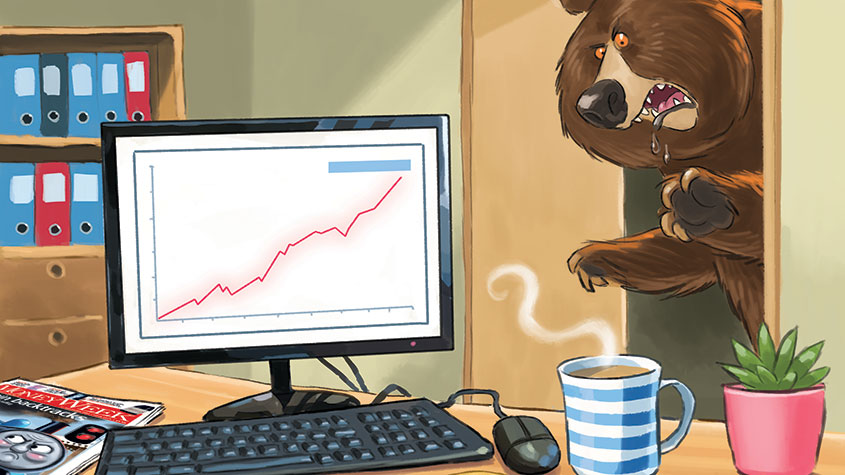Buying shares can be a tricky business
A tip gone bad reminds John Stepek that buying shares in troubled companies in the hope that they can turn themselves around doesn't always pay off.


Get the latest financial news, insights and expert analysis from our award-winning MoneyWeek team, to help you understand what really matters when it comes to your finances.
You are now subscribed
Your newsletter sign-up was successful
Want to add more newsletters?

Twice daily
MoneyWeek
Get the latest financial news, insights and expert analysis from our award-winning MoneyWeek team, to help you understand what really matters when it comes to your finances.

Four times a week
Look After My Bills
Sign up to our free money-saving newsletter, filled with the latest news and expert advice to help you find the best tips and deals for managing your bills. Start saving today!
Buying individual shares is a hazardous business. That’s why we have diversified portfolios and that’s why the majority of investors hold the lion’s share of their equities in funds of some sort, rather than holding individual companies. It’s also why I try to avoid tipping individual stocks – however convinced you are of a stock’s merits, you can never be sure that something won’t go wrong.
And so it has proved with my pre-Christmas share tip. In our 20 December issue, I suggested buying high-street stalwart Marks & Spencer (M&S), perhaps bolstered by the success of my 2018 tip, Next. I shouldn’t have got cocky – last Thursday, M&S promptly issued a Christmas trading update that sent its share price down by more than 10%. The group managed to grow like-for-like sales, but a poor performance from its clothing business saw disappointed investors sell out.
I’ll admit that I was in two minds about the original tip. I’ve slagged M&S off on several occasions over the years. My overall view – that it’s a complacent business that has been riding on the back of its undeserved “national treasure” status for years, if not decades, hasn’t changed dramatically. I even described it as being “not a terribly good company” and one “with a long history of disappointing”. So I can’t argue that this latest failure comes out of the blue. It’s clear that both the wider market and I had grown far too optimistic on the pace of its latest turnaround. So what’s the story now?
MoneyWeek
Subscribe to MoneyWeek today and get your first six magazine issues absolutely FREE

Sign up to Money Morning
Don't miss the latest investment and personal finances news, market analysis, plus money-saving tips with our free twice-daily newsletter
Don't miss the latest investment and personal finances news, market analysis, plus money-saving tips with our free twice-daily newsletter
I can’t say I’m pleased to have tipped a stock that has fallen by the best part of 15% in less than a month. That said, I’m going to give it the benefit of the doubt for now. Firstly, I think the fall mostly reflects the fact that investors had got their hopes up for a faster pace of change. Secondly, as I also pointed out in the original tip, if M&S’s recovery really can’t get any momentum behind it, then there’s surely scope for an activist investor to start pressing the board to split the group. With M&S’s deal with online grocery specialist Ocado coming to fruition this year, the shedding or shrinking of the troubled clothing and homeware units might be the best turnaround plan of all.
It’s a useful reminder that buying shares in troubled companies in the hope that they can turn themselves around is always a tricky business. If you’d rather stick to companies with more solid foundations, then turn to our cover story, where Stephen Connolly picks ten of his favourite high-quality European stocks that could be well placed to catch up with their more highly-valued peers in the US this year.
Elsewhere in the magazine, Max King looks at three of the biggest investment themes in the UK’s commercial property market right now. Student housing, healthcare premises, and self-storage are all booming, and for good reason – but have valuations been driven too high? Read his verdict in this week's magazine.
And for the truly adventurous investor, David Stevenson looks at a new exchange-traded fund (ETF) that enables investors to gain access to one of the most intriguing and controversial sectors around right now – the cannabis industry. That industry has already been through one boom and bust, but I’m quite sure that there will be plenty more ups and downs to come. Not unlike the rather less exotic M&S.
Get the latest financial news, insights and expert analysis from our award-winning MoneyWeek team, to help you understand what really matters when it comes to your finances.

-
 8 ways the ‘sandwich generation’ can protect wealth
8 ways the ‘sandwich generation’ can protect wealthPeople squeezed between caring for ageing parents and adult children or younger grandchildren – known as the ‘sandwich generation’ – are at risk of neglecting their own financial planning. Here’s how to protect yourself and your loved ones’ wealth.
-
 What are Avios-only flights and who is eligible?
What are Avios-only flights and who is eligible?Avios-only flights have proved incredibly popular since launching in 2023. We explain what they are, how they work and who qualifies
-
 The dangers of derivatives as the “Goldilocks era” ends
The dangers of derivatives as the “Goldilocks era” endsEditor's letter This is no longer a benign environment for investors, says Andrew Van Sickle. But – as the recent pension-fund derivatives blow-up shows – not everybody seems to have grasped that.
-
 What to do as the age of cheap money and overpriced equities ends
What to do as the age of cheap money and overpriced equities endsEditor's letter The age of cheap money, overpriced equities and negative interest rates is over. The great bond bull market is over. All this means you will be losing money, says Merryn Somerset Webb. What can you do to protect yourself?
-
 Investors are bullish – but be very careful
Investors are bullish – but be very carefulEditor's letter Many investors are buying the dip, convinced the latest upswing is the start of a new bull market. The odds are that it’s not, says Andrew Van Sickle. The bear has unfinished business.
-
The MoneyWeek approach to investing
Editor's letter At MoneyWeek, our aim is simple: to give you intelligent and enjoyable commentary on the most important financial stories, and tell you how to profit from them. So how do we do that?
-
 Celebrity bitcoin ads echo the subprime mortgage crisis
Celebrity bitcoin ads echo the subprime mortgage crisisEditor's letter A wave of ads featuring celebrities punting crypto to the masses are reminiscent of how low income Americans were encouraged to take on loans they couldn’t afford, says Merryn Somerset Webb.
-
 Will the UK's property slowdown turn into a house-price crash?
Will the UK's property slowdown turn into a house-price crash?Editor's letter As the cost-of-living crisis intensifies and interest rate rise, it is hard to see reasons for UK house prices to keep rising, says Merryn Somerset Webb.
-
 The unintended consequences of ESG investing
The unintended consequences of ESG investingEditor's letter Many people are refusing to invest in energy companies, citing "ESG" concerns. But we still need fossil fuels, says Merryn Somerset Webb, and will for years to come. Boycotting the sector is a bad idea.
-
 What sardines can teach investors about today's markets
What sardines can teach investors about today's marketsEditor's letter A California tale of “eating sardines” and “trading sardines” can help us divide investments into speculative and real, says Merryn Somerset Webb. Something that's very useful when looking at today’s markets.